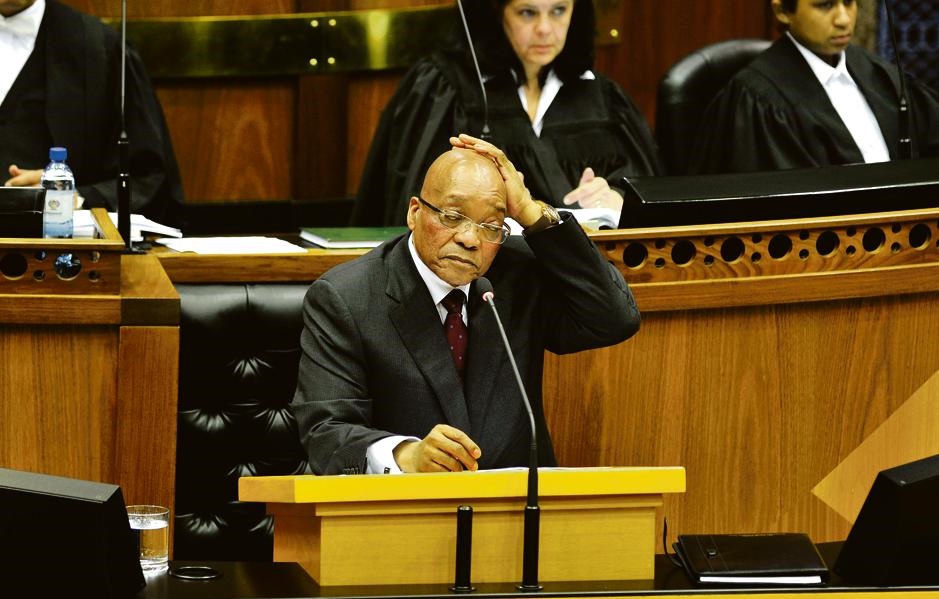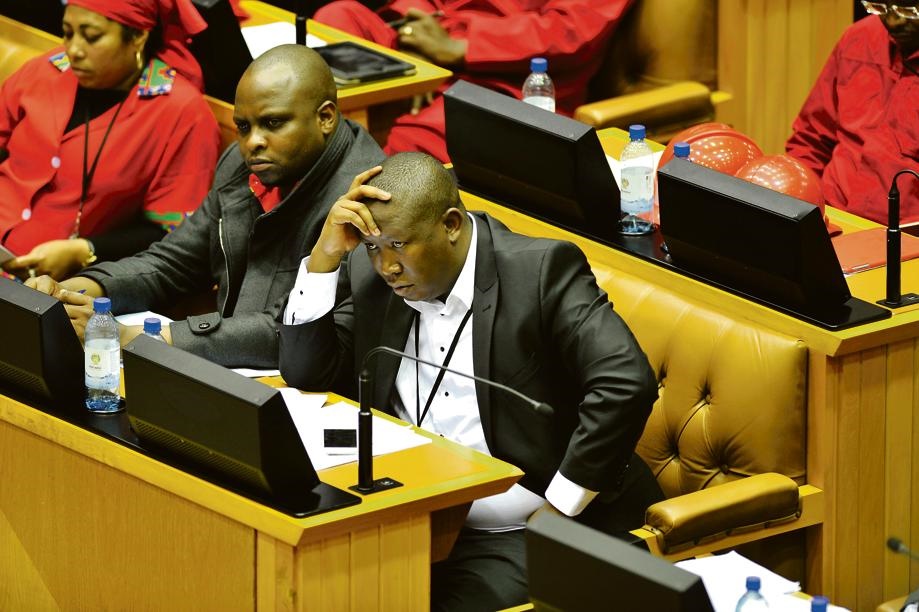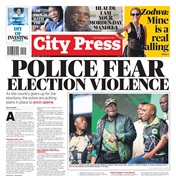The sturdy ship built by two men who helped each other out many times politically was destined to run aground, writes Mondli Makhanya
One day in the not-too-distant future, recorders of history will look back and marvel at how two powerful men influenced the trajectories of one another’s careers.
It will be an epic story of loyalty, respect, ambition, falling out, hatred and back-stabbing. The two main characters in the plot – Jacob Zuma and Julius Malema – are probably the smartest, most charismatic and ruthless political operators in the land right now.
Malema is a streetwise, natural-born leader and a brutal executioner of opponents.
Zuma is cunning and equally lethal in dealing with those who stand in his way. So lethal is he that legend has it that he acquired his double head by swallowing his twin in the womb during a struggle for nutrition.
The recorders of history will particularly look back at the events of the first week of August 2015 – a week that was defined by the battles and fortunes of the two men.
They will recall that Malema – once a dedicated disciple of the older man – stood in front of court this week and defined himself as the ultimate anti-Zuma proselytiser.
He cheekily stated that, unlike others who pretended to want their “day in court”, he would never run away from the opportunity to prove his innocence.
“This dark cloud has to be resolved. And therefore any form of sickness or death or any other material condition should never prevent me from having my day in court. I plead with the judge and the national prosecuting authority. You have accused me for too long; let me have my day in court‚” he told his supporters.
He further contrasted himself with President Zuma by instructing his supporters not to come and support him in court, a far cry from the Zuma camp’s past encouragement of his backers to form an intimidating mass outside courts whenever he appeared before judges.
The historians will record that the president’s week began with an ugly fight with the Public Protector and ended with humiliation in Parliament, where he rendered himself “President Angazi” by repeatedly pleading ignorance of issues that were common cause.
But as much as Malema would like to differentiate himself from Zuma, their histories and fortunes are intertwined. They have lifted each other and brought each other down. They have stood together against common enemies, jointly dealt ruthlessly with foes and had each other’s backs when times were rough.
It was Malema, then a young provincial secretary of the ANC Youth League in Limpopo, who was in the front line of Fikile Mbalula’s shock troops in the run-up to the watershed Polokwane conference.
Using the plausible excuse of being young and immature, those shock troops dealt harshly with then president Thabo Mbeki and his allies. They composed and popularised the crude songs about Zuma’s perceived tormentors during his troubles with the law.
Once Zuma had been crowned ANC leader, it was Malema, by then the youth league president, who was thrust by the elders to the fore of the putsch that ousted Mbeki from the Union Buildings.
A senior leader who backed Malema for the presidency of the league in 2008 explained at the time that with Mbalula’s age-enforced exit, a person of Malema’s forcefulness was needed to protect Zuma from ambitious sharks in the Polokwane coalition.
Malema played the role like a Real Madrid defender, scaring the pants off anyone – inside and outside the ANC – who posed a threat to Zuma. No one, not even bishops and senior Cabinet ministers, was spared Malema’s poisonous bite.
Zuma returned the favour, protecting the enfant terrible from those who sought to prune his power. Zuma praised him from the hilltops, even suggesting he was a Nelson Mandela in the making.
At the height of his youth league presidency, Malema struck fear into the hearts of the grizzled, grey-haired men at Luthuli House and in Cabinet – such was the power he derived from his close association with Number One.
But as the isiZulu saying goes, okungapheli kuyahlola (all good things come to an end). In this case though, the good thing was not such a good thing. It was a relationship that was destructive for the nation, founded on the premise of Mafia-style mutual protection.
In engineering Malema’s downfall, Zuma rendered his protégé vulnerable. Without the cover of the ANC, Malema was open to attacks from all angles. Law enforcement agencies and the revenue service – who had all along been aware of, but turned a blind eye to, his questionable business dealings – were let loose on him.
It also became open season for all those Malema had hurt in the ANC, and they were determined to make him feel the pain he had inflicted on them.
Drenched and shivering in the rain, Malema begged to be let back inside the house during the ANC’s Mangaung conference. But Zuma, who was now surrounded by many who Malema had once bullied and bruised, slammed the door in his face.
This fallout between “father and son” was to have a profound impact on South African politics. Rather than killing him off, Malema’s time in the downpour spawned a new man who would go on to make Zuma’s life a misery.
The Economic Freedom Fighters (EFF) may be based on some form of populist and militant politics, but it derives its energy from the need to exact vengeance on Zuma and others who turfed Malema and his associates out into the cold.
This week, the ongoing battle between the two men played out in a courthouse in the northernmost city of Polokwane and the parliamentary precinct in the southernmost city of Cape Town.
In Polokwane, Malema took the fight to the president by using the platform to accuse Zuma’s government of using the state machinery to kill him and his party off. In Parliament, he pummelled Zuma with his “pay back the money” torture campaign.
Malema has now opened a new front by taking the Nkandla matter to the Constitutional Court. So the next time they meet, it will be in the city of Johannesburg.
If South Africa’s political scene were the MGM Grand, the judges would have Malema ahead on points. He is dictating the terms of this fight, while the more powerful man has to rely on counterpunches to keep up.
Through the EFF’s rumbustious political style, Malema has distracted the ANC from its many agenda items and focused the party’s energy and resources on defending its leader.
Some in the party have suggested that if Zuma were to be recalled before the end of his term, it would be because Nkandla had made him a liability.
Barring a conviction and jail sentence against Malema, it is likely the younger man will continue to haunt Zuma beyond his term of office.
The thing that will define Zuma’s legacy more than anything else will be the matter of that compound with its fire pool and cattle culvert – a matter Malema has made sure never leaves the tongues of South Africans.
Talk to us: Who do you think will win the battle between President Jacob Zuma and EFF leader Julius Malema, and why?




 Publications
Publications
 Partners
Partners










